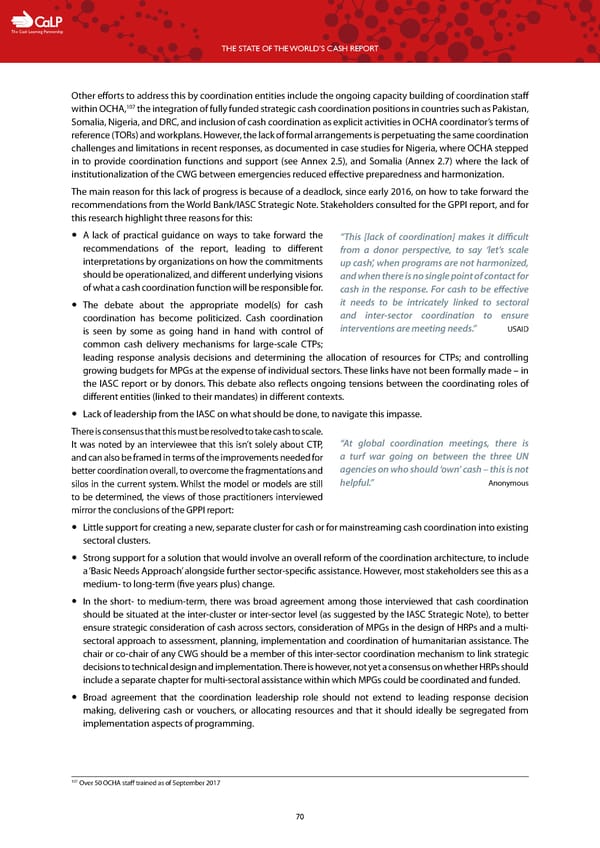C The Cash Learning Partnership THE STATE OF THE WORLD’S CASH REPORT Other efforts to address this by coordination entities include the ongoing capacity building of coordination staff 107 within OCHA, the integration of fully funded strategic cash coordination positions in countries such as Pakistan, Somalia, Nigeria, and DRC, and inclusion of cash coordination as explicit activities in OCHA coordinator’s terms of reference (TORs) and workplans. However, the lack of formal arrangements is perpetuating the same coordination challenges and limitations in recent responses, as documented in case studies for Nigeria, where OCHA stepped in to provide coordination functions and support (see Annex 2.5), and Somalia (Annex 2.7) where the lack of institutionalization of the CWG between emergencies reduced effective preparedness and harmonization. The main reason for this lack of progress is because of a deadlock, since early 2016, on how to take forward the recommendations from the World Bank/IASC Strategic Note. Stakeholders consulted for the GPPI report, and for this research highlight three reasons for this: — A lack of practical guidance on ways to take forward the “This [lack of coordination] makes it difficult recommendations of the report, leading to different from a donor perspective, to say ‘let’s scale interpretations by organizations on how the commitments up cash’, when programs are not harmonized, should be operationalized, and different underlying visions and when there is no single point of contact for of what a cash coordination function will be responsible for. cash in the response. For cash to be effective — The debate about the appropriate model(s) for cash it needs to be intricately linked to sectoral coordination has become politicized. Cash coordination and inter-sector coordination to ensure is seen by some as going hand in hand with control of interventions are meeting needs.” USAID common cash delivery mechanisms for large-scale CTPs; leading response analysis decisions and determining the allocation of resources for CTPs; and controlling growing budgets for MPGs at the expense of individual sectors. These links have not been formally made – in the IASC report or by donors. This debate also reflects ongoing tensions between the coordinating roles of different entities (linked to their mandates) in different contexts. — Lack of leadership from the IASC on what should be done, to navigate this impasse. There is consensus that this must be resolved to take cash to scale. It was noted by an interviewee that this isn’t solely about CTP, “At global coordination meetings, there is and can also be framed in terms of the improvements needed for a turf war going on between the three UN better coordination overall, to overcome the fragmentations and agencies on who should ‘own’ cash – this is not silos in the current system. Whilst the model or models are still helpful.” Anonymous to be determined, the views of those practitioners interviewed mirror the conclusions of the GPPI report: — Little support for creating a new, separate cluster for cash or for mainstreaming cash coordination into existing sectoral clusters. — Strong support for a solution that would involve an overall reform of the coordination architecture, to include a ‘Basic Needs Approach’ alongside further sector-specific assistance. However, most stakeholders see this as a medium- to long-term (five years plus) change. — In the short- to medium-term, there was broad agreement among those interviewed that cash coordination should be situated at the inter-cluster or inter-sector level (as suggested by the IASC Strategic Note), to better ensure strategic consideration of cash across sectors, consideration of MPGs in the design of HRPs and a multi- sectoral approach to assessment, planning, implementation and coordination of humanitarian assistance. The chair or co-chair of any CWG should be a member of this inter-sector coordination mechanism to link strategic decisions to technical design and implementation. There is however, not yet a consensus on whether HRPs should include a separate chapter for multi-sectoral assistance within which MPGs could be coordinated and funded. — Broad agreement that the coordination leadership role should not extend to leading response decision making, delivering cash or vouchers, or allocating resources and that it should ideally be segregated from implementation aspects of programming. 107 Over 50 OCHA staff trained as of September 2017 70
 The State of the World's Cash | Full Report Page 71 Page 73
The State of the World's Cash | Full Report Page 71 Page 73